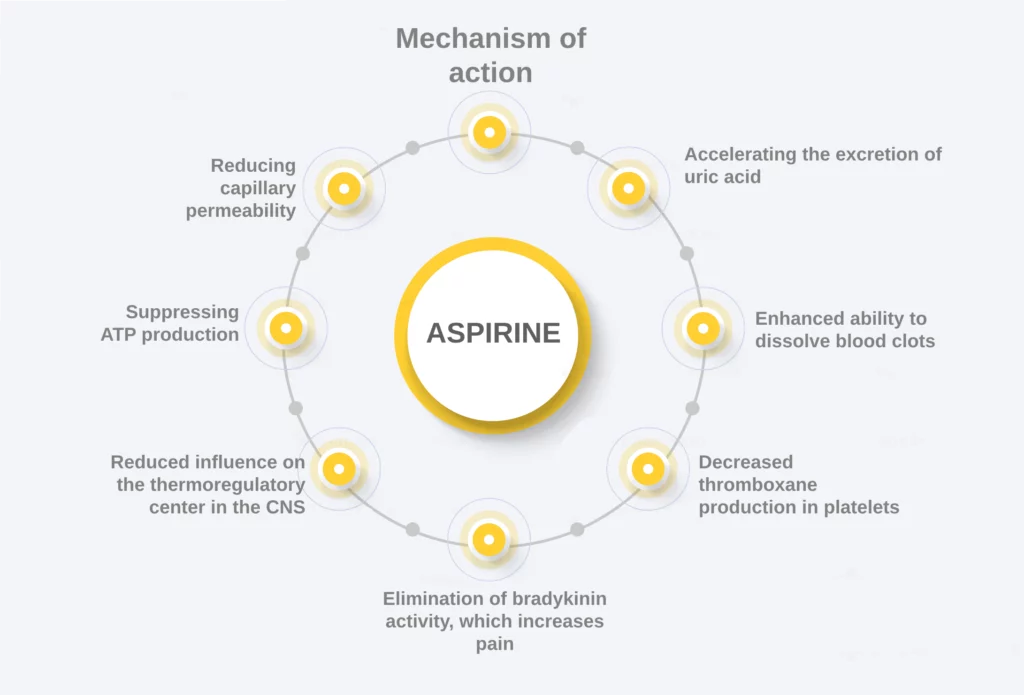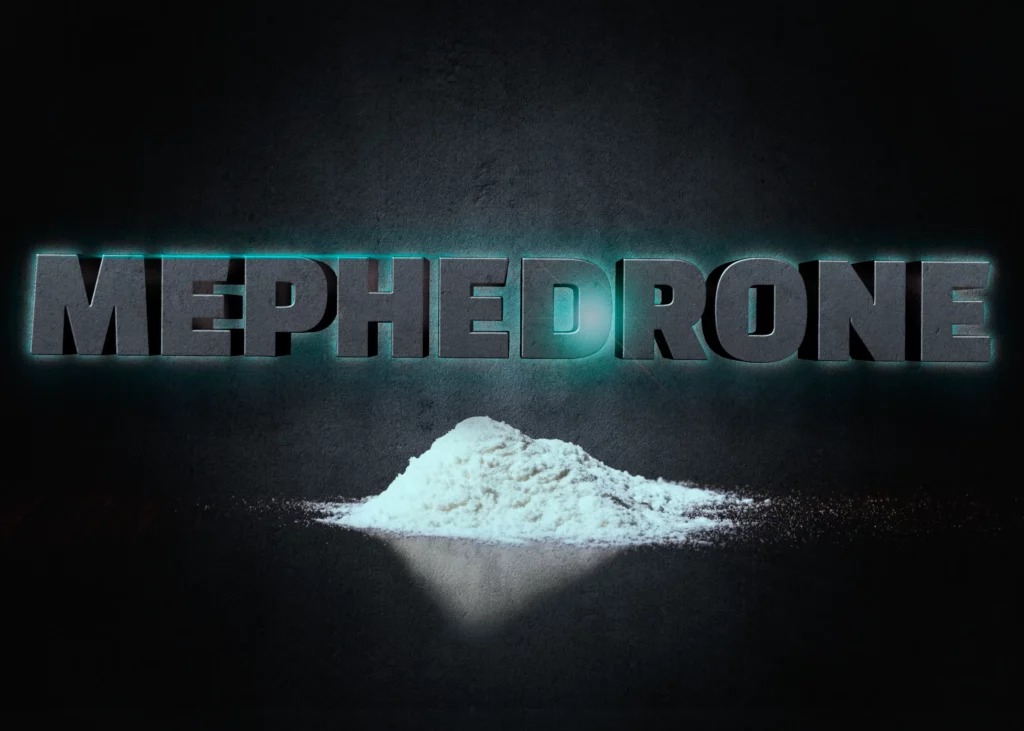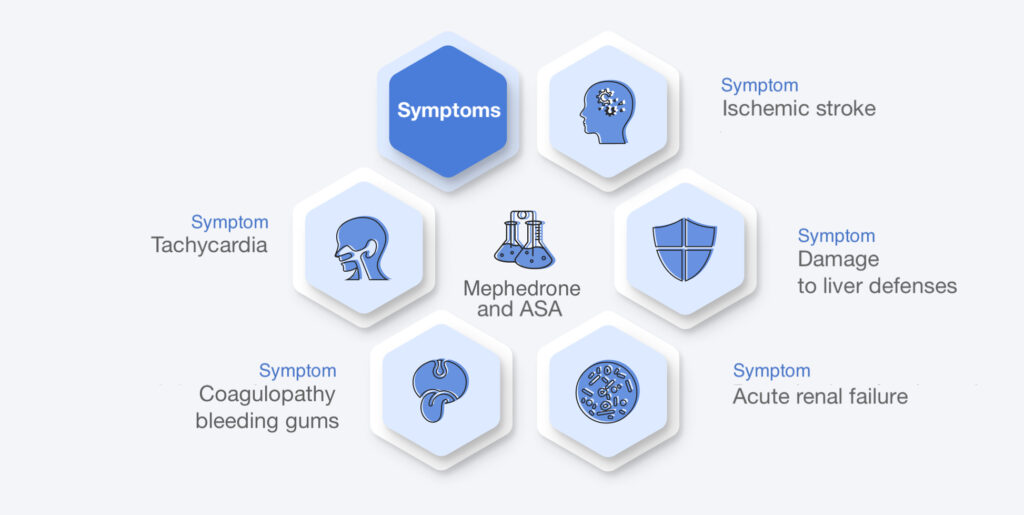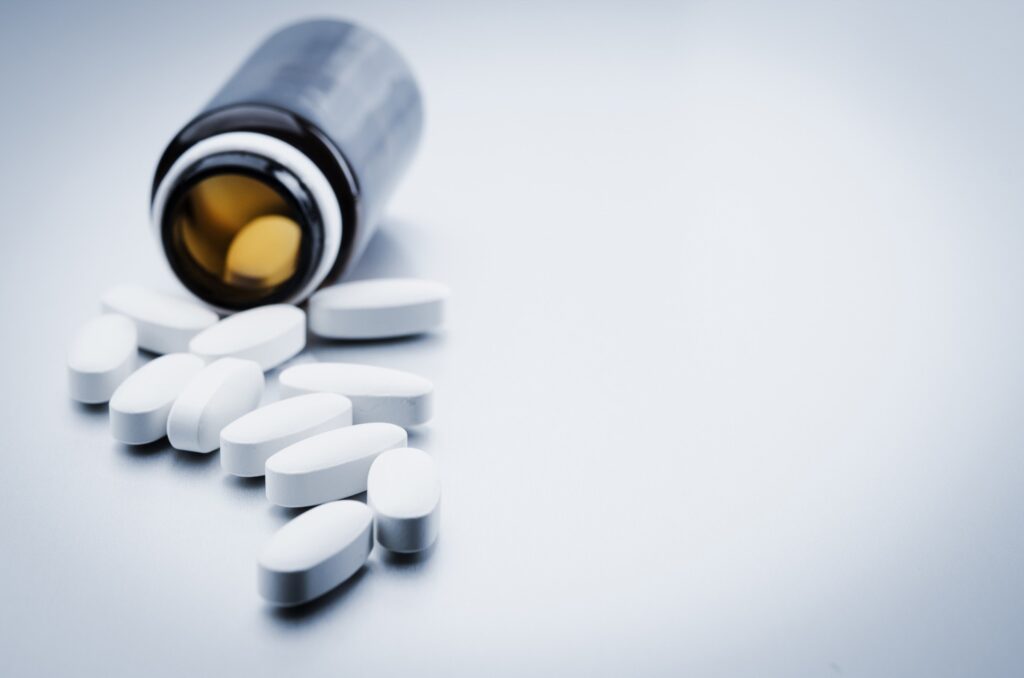Acetylsalicylic acid belongs to the group of non-steroidal anti-inflammatory drugs. It has an antipyretic effect, suppresses inflammatory reactions, reduces pain. In small doses, it has an antiaggregant effect and blood thinner. But among drug users, aspirin and mephedrone are used together to enhance the psychoactive effect.

Mechanism of action of acetylsalicylic acid
Aspirin, the active ingredient of which is acetylsalicylic acid, has an effect by blocking cytokines and prostaglandins involved in the maintenance of the inflammatory response. The effect after the pill is taken is due to the following mechanisms:
- Reduction of capillary permeability
- Suppression of ATP production in the focus of inflammation, which locally reduces the temperature
- Reduction of energy supply of the thermoregulation center in the hypothalamus
- Elimination of bradykinin activity, which increases pain
- Decrease in the production of thrombaxan in platelets, which leads to a decrease in blood clotting
- Increasing fibrinolysis in the blood, or the ability to dissolve clots
- Accelerating the excretion of uric acid
After ingestion, acetylsalicylic acid is quickly absorbed in the stomach. But when using film-coated tablets, the active substance is absorbed already in the small intestine.

Cyclooxygenase (COX) is not only the active ingredient in inflammatory reactions, it is produced in the stomach and helps protect it from hydrochloric acid. Taking aspirin blocks COX production, so taking acetylsalicylic acid for long periods of time increases the risk of stomach ulcers.
The action of aspirin begins 15-20 minutes after taking it, and the maximum concentration in the blood is noted in 2 hours. The drug is excreted unchanged mainly by the kidneys.
Acetylsalicylic acid was first synthesized by French scientist Charles Frederic Gerard in 1853, the basis was the bark of the willow tree. But acetylsalicylic acid in a form suitable for medical use was created in the laboratories of Bayer.

Side effects
Negative effects of the drug on the body may occur with prolonged use of small doses or a single intake of a large number of tablets. Most often the following effects are observed:
- Thrombocytopenia, anemia
- Abdominal pain, heartburn, gastritis and peptic ulcer
- Severe bleeding from the digestive tract
- Allergic reactions
- Aspirin asthma
- Liver and kidney dysfunction
In case of overdose, the side effects intensify and take a severe form. Therefore, it is not recommended to take acetylsalicylic acid for people suffering from bronchial asthma, gastritis and peptic ulcer. The tablets are dangerous in thrombocytopenia, a tendency to bleeding and renal dysfunction.
Why combine aspirin and mephedrone
Mephedrone acts on hypothalamic centers by enhancing the release of dopamine and norepinephrine. This provides the appearance of effects on the central nervous system. Under the influence of the narcotic substance, mood improves, motor activity and speech increases.
Addicts who use mephedrone take acetylsalicylic acid at the same time or at a short interval. Pills after absorption change the state of blood vessels, the work of renal tubules and the secretion of mephedrone. Therefore, the narcotic substance is retained in the blood longer. The effect on the psyche is more pronounced and lasts longer. In some cases, it allows reducing the dose of the drug.

Danger of co-administration
Simultaneous use of acetylsalicylic acid and mephedrone more easily causes symptoms of drug overdose, which are manifested by the following signs:
- Tachycardia
- Marked increase in blood pressure
- Generalized vasospasm
- Ischemic stroke
- Myocardial infarction
- Aortic dissection
- Acute renal failure
- Coagulopathy
Aspirin and mephedrone further reduce blood clotting, so bleeding occurs more easily and is harder to stop. For an addicted person, another use of the drug can be fatal.
Medical care in such a condition is given as an emergency. Treatment is aimed at maintaining the cardiovascular system, breathing, reducing the risk of coagulopathy and bleeding.
Conclusion
Acetylsalicylic acid is used with mephedrone to enhance the effects of the drug. For the addict, it is an opportunity to reduce the dose and get more pronounced sensations. But at any time the side effects of aspirin can increase, leading to high blood pressure, cardiovascular damage and risk of death.
